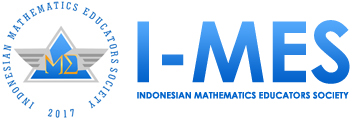Application of Logistic Differential Equation to Investigate The Extent of Emphasizing Stimulus Variation in Mathematics Instruction
DOI:
https://doi.org/10.35706/sjme.v3i1.1433Abstrak
The knowledge and skills in mathematics processes can be provided in an effective and systematic manner only by teaching mathematics in schools. Stimulus variation as a teaching skill is used to stimulate students’ interest and attract their attention to the lesson presentation. Therefore, this study investigated the extent of emphasizing stimulus variation in mathematics instruction using logistic differential equation. The study adopted a developmental survey design where a cross-section of in-service mathematics teachers in Imo State numbering 94 were continuously observed and surveyed to decipher their extent of emphasizing stimulus variation in the classroom to promote teaching excellence. The observations were carried out for 14 days and the data were generated based on direct observational technique (using observation schedule). The result revealed inadequate and inconsistent emphasis of stimulus variation teaching skill in mathematics instruction. This implies that pre-service mathematics teachers seldom emphasize stimulus variation when teaching mathematics. It was recommended that mathematics teachers should always employ the skill of stimulus variation in class during instructional delivery so as to enhance students’ learning experience and satisfaction thereby promoting teaching excellence.
Unduhan
Referensi
Adeyanju, T.K. (2013). Quality teacher in every classroom: Prospects and challenges. A Pre-Convocation Guest Lecture at the Maiden Convocation Ceremony for the Award of Nigeria Certificate in Education (NCE) and Conferment of Fellowship; FCT College of Education, Zuba-Abuja.
Anaekwe, M.C., Nzelum, V.N., Olisakwe, S. I & Okpala, J. U (2010). Principles and methods of science education. Onitsha: Sofie Publicity and Printry Ltd.
Azuka, B. F. (2015). Mathematics education for sustainable development: Implications to the production and retention of mathematics teachers in Nigerian schools. British Journal of Education 3(1), 44-51.
Chatzidimou, K. (2011). Microteaching, a ‘middle aged’ educational innovation: still in fashion? International Conference: The Future of Education: SOE15- chatzidimai. pdf. Foxit Reader
Ghafoor, A. Kiani, A., Kayani, S & Kayani, S. (2012). An exploratory study of microteaching as an effective technology. International Journal of Business and Social Sciences 3(4) 224-238.
Igwe, R.O., Uzoka, N.E. & Rufai, S.A. (2013). reflective effects of microteaching and field experiences on pre-service teachers in Nigeria. Asean Journal of Teaching in Higher Education 5(1) 57-68
Ijaiya, N.Y.S. (2013). Skill training in teacher education: PDF Document.
Jaja, J. M (2013). Higher education in Nigeria: Its gain, its burden. Global Journal of Human Social Science Linguistics & Education, 13 (14), 21-29.
Kanno, T.N. (Retrieved on April 25, 2013). Transferability of set induction and questioning skills of microteaching to actual teaching practice. Abuja. Nigerian Educational Research and Development Centre.
Kilic, A. (2010). Learner-centred microteaching in teacher education. International Journal of Instruction, 3(1), 77-100.
Kolawole, E & Oluwatayo, J (2004). Mathematics for everyday living. “Implication for Secondary Schools”. Mathematical Association of Nigeria (MAN) proceeding of September 2004 National Conferences Sokoto.
Kulbir S. S (2006). Teaching of Mathematics. New Delhi, India Sterling Publishers.
Maheshwari, V.K. (2011). Instructional skill of stimulus variation. Retrieved from: www.vkmaheshwari.com
National Examination Council (NECO) (2016). Chief Examiner’s reports (Nigeria) SSCE, May/June examinations.
Nwanekezi, A.U., Okoli, N.T. & Mezieobi, S.A. (2011). Attitude of student teachers towards teaching practice. Journal of Emerging Trends in Educational Research and Policy Studies (JETERAPS) 2 (1), 41-46.
Odili GA (2006). Mathematics in Nigeria Secondary Schools. A Teaching Perspective. Port-Harcourt – Rex – Charles and Patrick Ltd.
Ofoefuna, M.O. (2002). Mediated micro-teaching practicum, A worthwhile innovation in the teacher education program at the university level in Nigeria: Journal of the World Council for Curriculum and Instruction, Nigeria Chapter 3(1) 95-104.
Ogeyik, M.C. (2009). Attitudes of the student teachers in english language teaching programs towards microteaching techniques. English Language Teaching 2 (3) 205-212.
Okoye, U.E. (2007). Quality control in teacher production: The case of Nigeria colleges of education. A Book of Proceeding of the National Conference, Faculty of Education, University of Abuja.
Onocha, C. O. (2013). Functional education and graduate employability. A Keynote Address of the 15th National Conference of the Association of Educational Researchers and Evaluators, Nigeria (ASSEREN) held at University of Ilorin, Nigeria on July 8-13 2013.
Tali, D., Mbwas, L& Abe, A (2012). The teaching of mathematics in secondary schools as a tool for self-reliance and re-branding process in Nigeria. Educational Research and Reviews, 7(1),1-4.
Ugwu, B & Ikpegbu, J (2000). Elementary differential equations. Enugu: Ikenga Publishers.
Unamba, E & Obasi, C (2011). Utilizing ICT in teaching mathematics in secondary schools in Imo State. Alvana Journal of sciences, 5(1): 198-203.
WAEC Chief Examiners Reports (2016). Publication of WACE office, Lagos.
##submission.downloads##
Diterbitkan
Cara Mengutip
Terbitan
Bagian
Lisensi
Hak cipta dilindingi undang-undang berdasarkan Undang-undang Nomor 28 Tahun 2014 tentang Hak Cipta. Dilarang memperbanyak isi jurnal ini, baik sebagian maupun seluruhnya dalam bentuk apapun tanpa izin tertulis dari SJME (Supremum Journal of Mathematics Education) sebagai pemegang Hak Cipta terhadap seluruh isi dari jurnal tersebut.
Penulis yang menerbitkan jurnal ini setuju dengan persyaratan berikut:
- Penulis mempertahankan hak cipta dan memberikan hak jurnal tentang publikasi pertama dengan karya yang secara bersamaan dilisensikan di bawah Lisensi Atribusi Creative Commons yang memungkinkan orang lain membagikan karya tersebut dengan pengakuan dari karya penulis dan publikasi awal dalam jurnal ini.
- Penulis dapat memasukkan pengaturan kontrak tambahan yang terpisah untuk distribusi non-eksklusif dari versi terbitan jurnal tersebut (misalnya, kirimkan ke repositori institusional atau publikasikan dalam sebuah buku), dengan sebuah pengakuan atas publikasi awalnya di Jurnal ini.
- Penulis diizinkan dan didorong untuk memposting pekerjaan mereka secara online (misalnya di repositori institusional atau di situs web mereka) sebelum dan selama proses penyampaian, karena dapat menyebabkan pertukaran yang produktif, serta kutipan karya yang diterbitkan sebelumnya dan yang lebih lama.










